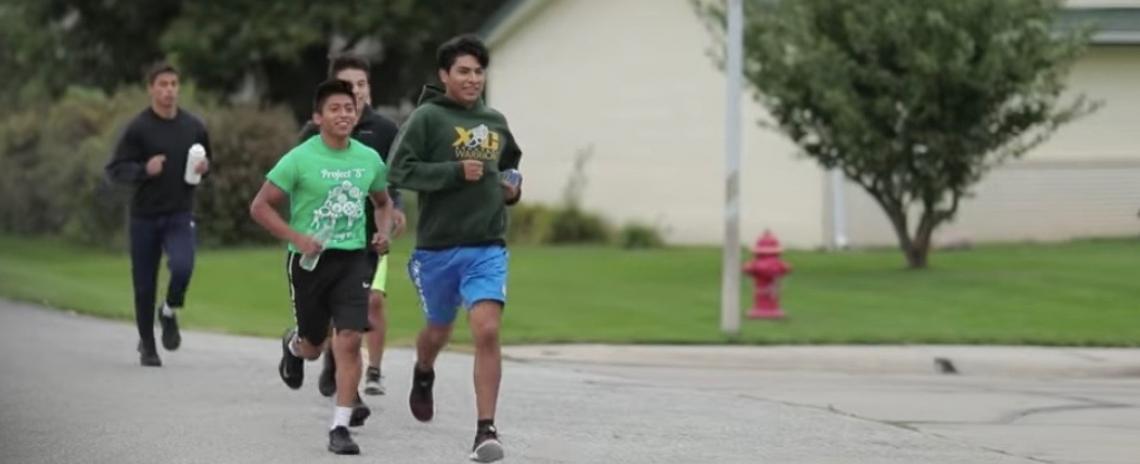A Simple Ask: Kindness and its spot at the table of competition
A Simple Ask: Kindness and its spot at the table of competition
By Tyler Dahlgren
It was the fall of 2017, and something was off with the spirit of competition in the state of Nebraska.
Teams from schools with high minority populations weren’t having the most enjoyable experiences on the road.
Schuyler Central Activities Director Jim Kasik, for example, had seen kids spit on. He’d heard racial slurs and disheartening chants of “Build the Wall!”
Something was wrong, alright. Broken, even. And the ensuing discussions focused on cultivating kindness weren't exactly a walk in the park.
“We wanted to pose the question of ‘What’s it like to walk in their shoes and what’s it like to deal with what they have to deal with?’" said Darin Boysen, Executive Director for the Nebraska Coaches Association. “We wanted to pose those questions without pointing fingers, which was a difficult balancing act.”
NCA and the Nebraska School Activities Association (NSAA) started having conversations with other educational organizations throughout the state regarding possible ways to mend kindness into the state’s culture of competition.
Nebraska’s educational leaders were on the same page, ready to help, and a short film began to materialize. One that would place viewers into the shoes of a high-minority school and help them to understand the tolls of such adversity.
“That was going to be the main theme of the project, and, really, our top goal,” Boysen said. “What’s it like to walk in their shoes? To teach in their shoes? To coach in their shoes? To be an administrator or a board member in their shoes?”
Enter a courageous crew of Schuyler Warrior administrators, coaches and athletes. And enter Striv.TV, a Nebraska-based live streaming and media outlet designed to help schools develop a voice.
Together, they produced a nearly eight-minute project that is neither a political statement or a call for kids and fan-bases to let their foot off the proverbial pedal of competitive spirit.
“Striv and Taylor Siebert deserve so much credit for the production of the film and for what they do for our schools,” Boysen said. “They did a lot of listening to what our mission and our goals were, and the film really captures that.”
What the film accomplished more than anything, and, to no surprise with Striv.TV behind the project, is providing a school, and its students, a platform. A simple voice, and a way to call for kindness.
“We can talk, on our end of being administrators, coaches and teachers, of kindness and we’ve kind of heard it all before,” said NSAA executive director Jay Bellar, a former superintendent. “But when the kids start sharing their experiences, it’s powerful.”
Bellar was a member of NSAA’s board when Lexington Public Schools came to a meeting and expressed concerns with the way their players were being treated on the road. Their request, much like Schuyler’s and schools from throughout the state, was really quite simple.
“They just wanted to be treated the way other people were treated,” Bellar said. “It wasn’t a big ask. It was a fair ask.”
Why, Lexington asked, do schools need to hold some variation of an “Americanism Night” seven out of every 10 times we compete?
“They were good questions and they didn’t want anything more than to be treated like other teams were treated,” Bellar, who spent the early part of his life living on a reservation, said.
In the film, Kasik, a 1984 Schuyler graduate, talks about conversations held 40 years ago on park benches throughout Schuyler. The language spoken then might have been Czech. Now, those conversations might be shared in Spanish. Truly, what's the difference? Why the animosity?
“Their ancestors and their families have the same goals for their children and their families,” Boysen said. “In the realm of activities and sports, and particularly the sports with contact and intense competitiveness, this message can truly bring a lot of good if it’s done right.”
Boysen likens athletics and activities to the front porch of a school. Community members can drive by and take a glance at that front porch, and if it indicates the school is in good shape and others are being treated with respect, they’ll follow suit and embrace the culture.
“When our front porch is on fire and when things are in disarray, then look out,” he said. “When that's the case, communities have a hard time supporting the school and a hard time wanting to do positive things for the school.”
The push for kindness can’t be superficial, Boysen adds.
It must start with leadership and trickle down through teachers and coaches, to athletes and to students. The current climate in Nebraska, with the #BeKind movement spreading innumerable positive vibes, has helped the mission pack a significant and lingering punch.
The feedback has been overwhelmingly positive.
“Nothing but good,” Bellar adds.
At leadership and sportsmanship summits, the message has been relayed again and again.
"We've spent a lot of time having tough discussions with kids," Boysen said. "We've told them 'We're not going to force this down your throat, but we are going to let you guide this based on what fits into your community and what you experience and what you see."
Respect, kindness, reverence.
“It all meshes together, really,” said Bellar. “It’s about opening our eyes and embracing the fact that we are all a community of one.”
It’s time kindness takes its spot at the table of competition.
Right at the head.
Right where it belongs.


